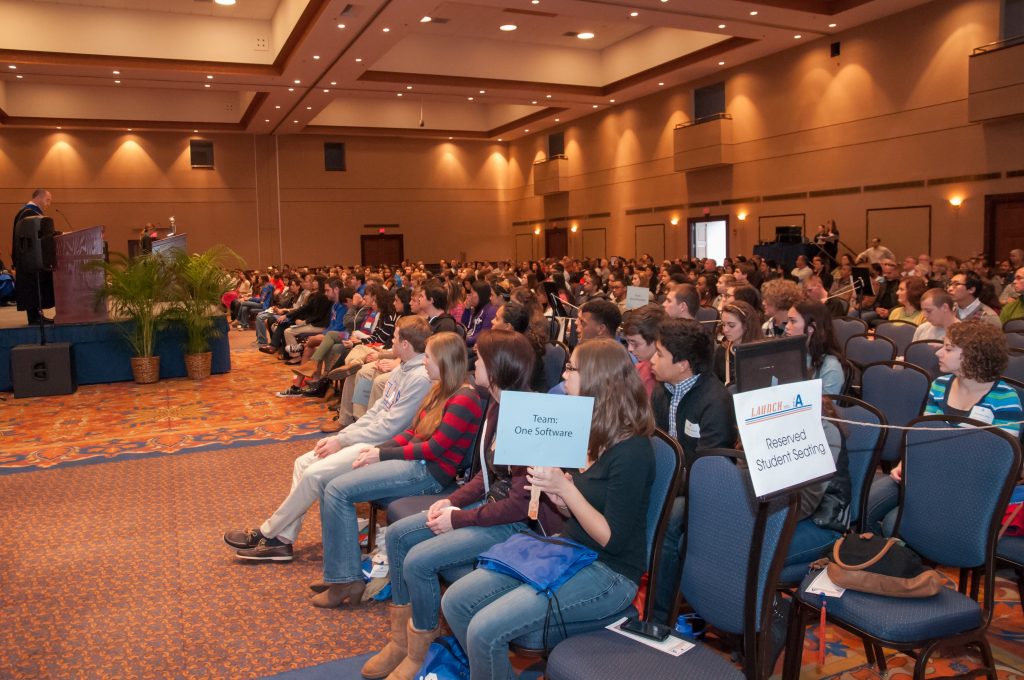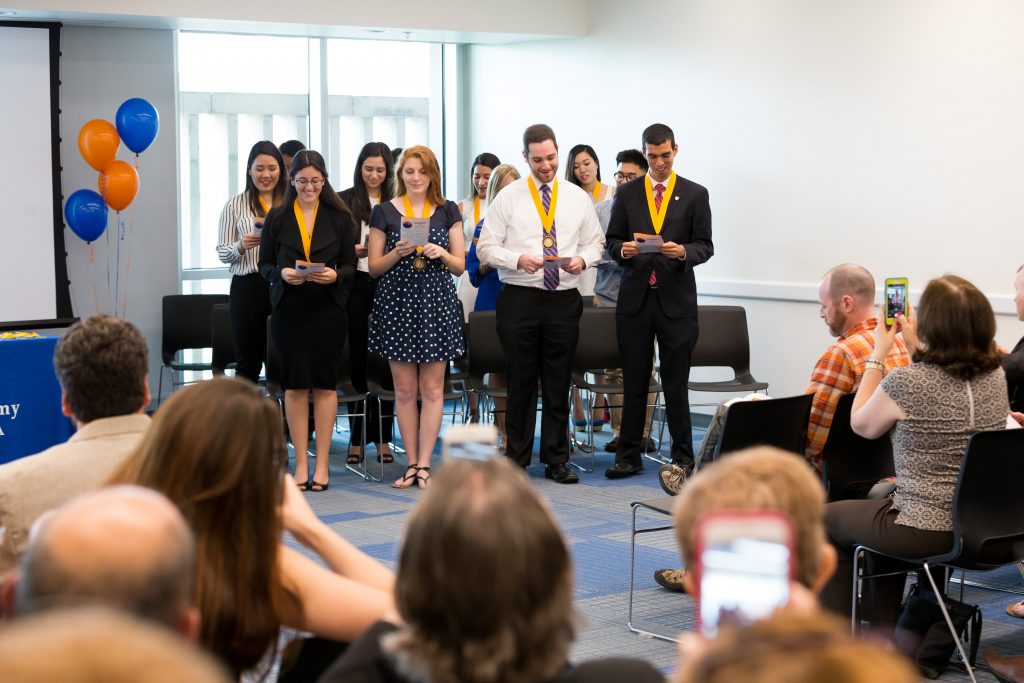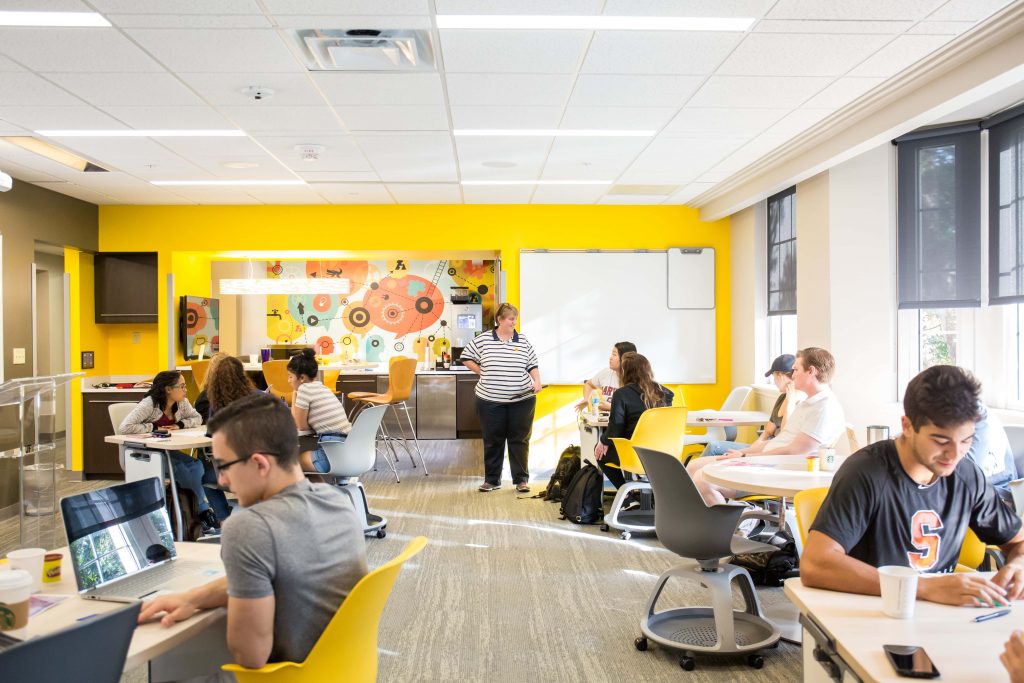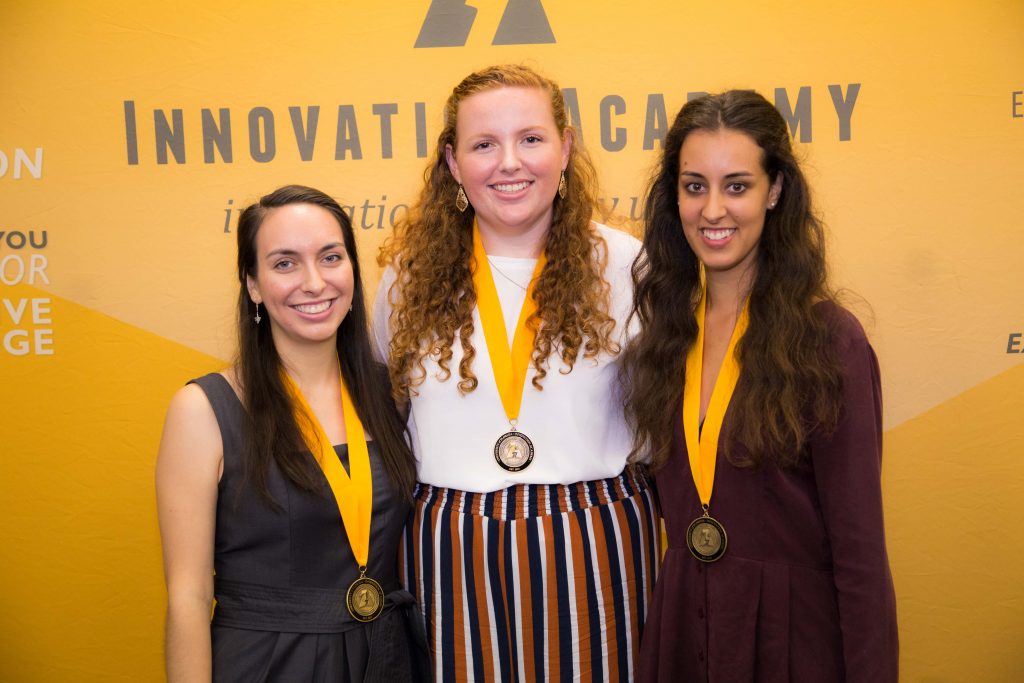IA History
2013 – 2015: Beginnings
In 2013, the UF Innovation Academy (IA) began as a pilot program to enroll and support academically talented students focused on developing knowledge to grow new ideas, unique opportunities, and cutting-edge services and products through an exclusive Innovation minor, living-learning community, and co-curricular events.

The UF Innovation Academy enrolled its first cohort of 300 students in the spring of 2013. Students were welcomed at IA’s Convocation event, “Launch Into IA,” which took place on January 4, 2013, in the Reitz Union Grand Ballroom with 900+ attendees. After students took the first Innovation minor course, Dynamic Creativity & Strategic Innovation, they enrolled in the second course, Creativity-in-Action, which applied the skills learned in the first course and built upon them to include design thinking and prototyping, testing, and presenting. This course culminated in the first Catalyst, then known as the “Innovation Showcase,” where student teams displayed dozens of prototypes that provided solutions to many student challenges.
Shortly after its founding in 2013, IA set up its permanent offices on the third floor of the UF Infirmary building alongside the Honors and McNair Scholars program offices. Here the IA program began to develop and envision a collaborative space that would include an active classroom where students could attend classes, hold meetings, study, or grab a quick cup of Starbucks coffee while discussing the next big idea amongst teammates. In 2015, through a generous donation from UF Alumnus, Sue McGrogan, the funding for this collaborative space was made available and design began on the McGrogan Active Learning Center.
2016 – 2018: Taking Off
By the spring of 2016, IA enrolled four cohorts at UF, totaling 1054 students on campus learning about innovation.

Additionally, the first IA cohort was set to graduate. To honor this milestone, an Innovation Medallion and Oath was developed in concert with student’s input, and a celebration ceremony called “Summit” to bestow the honor of completing the minor to graduating students and award them with the medallion.
“Challenges come with being the first in anything,” Danna Regnier, an alumna of the first IA cohort said, “But thanks to IA, I was trained to work effectively in an ambiguous environment with minimal direction—I can always figure out a way to accomplish my goal.”
With the completion of the innovative McGrogan Active Learning Center or MALC in 2016, IA was set to utilize this space to foster more collaboration, host team presentations, and serve as an anchor for the IA student experience. By 2018, IA had enrolled its largest incoming class with 409 incoming students, graduated over 100 students annually with the Innovation minor. The program also added curricular updates that included 3D printing and continued to build co-curricular experiences such as the ignite program, speaker series, a fall internship database, which enhanced opportunities for IA students.
2019 – 2021: Full Speed Ahead
As the University of Florida continued to rise in the rankings of public research universities, the Innovation Academy continued to serve and support our students in obtaining an outstanding education and experience that prepares them for the 21st-century workplace.
In 2019, IA partnered with the Loss Prevention Research Council (LPRC) to allow our students to work side-by-side on product loss and crime solutions. We implemented our Amicon management engagement program. Our students benefitted from learning first-hand the need for critical problem solvers (innovators) in construction management. We enlisted many of our alumni to expand the network of robust student engagement opportunities, including internships, permanent positions, and financial resources. Most notably, our students produced over 50 prototypes in partnership with the UF College of Education and focused on optimizing early childhood development. We sent IA students to competitive internships all over Florida and around the country. Additionally, we added the College of Education’s Education Sciences major to the list of available majors. We graduated 194 students with the Innovation minor. We sent IA students into the local community to share entrepreneurship and innovation basics with elementary-aged children.

In 2020, with the challenge of the COVID-19 pandemic, the resiliency of our faculty, staff, and students was on display. It allowed us an opportunity to highlight our creativity, leadership, and ability to pivot while enabling us a chance to practice these critical skills in real time. We seamlessly transitioned all our courses to online delivery, employed new innovative teaching tools, continued to build partnerships around the state and the country with schools and private industry, and cultivated a record-setting Gator Giving Day. Additionally, we expanded our total available square footage in preparation for adding a state-of-the-art student business incubator, pitch studio, and sophisticated prototyping and fabrication lab.
In 2021, we built an additional academic track in artificial intelligence. We offer our students a premier innovation education experience that includes the option of learning the fundamentals of artificial intelligence while still learning to innovate. Josh Linkner—a UF alum, also featured Innovation Academy in his new book “Big Little Breakthroughs—How Small Everyday Innovations Drive Oversized Results,” he lauds our curriculum for preparing students for the modern workforce. This year we continued to deliver all our courses online and transitioned back to in-person classes toward the end of the summer.
2022 – : Now and Beyond
Today IA is a community of over 1,000+ students on campus with a network of 2500+ alumni around the country and the world.

In the past ten years, the UF Innovation Academy has grown from an idea to a dynamic program that continues to deliver innovation education, experiences, and opportunities for our students who are poised to be leaders in the working world of the 21st century. The program continues to expand its footprint and strives to grow our community partnerships, develop innovation leaders of tomorrow, and solve local, national, and global issues with skills acquired from the Innovation Academy.
“I am hopeful the IA program will continue developing innovative leaders through our curriculum and co-curricular programs,” Dr. Citty said. “Additionally, we will seek to expand our resources in prototyping, pitching, and idea incubation to allow students to tinker, play, and create to have the freedom to experiment and develop ideas that will shape tomorrow.”
